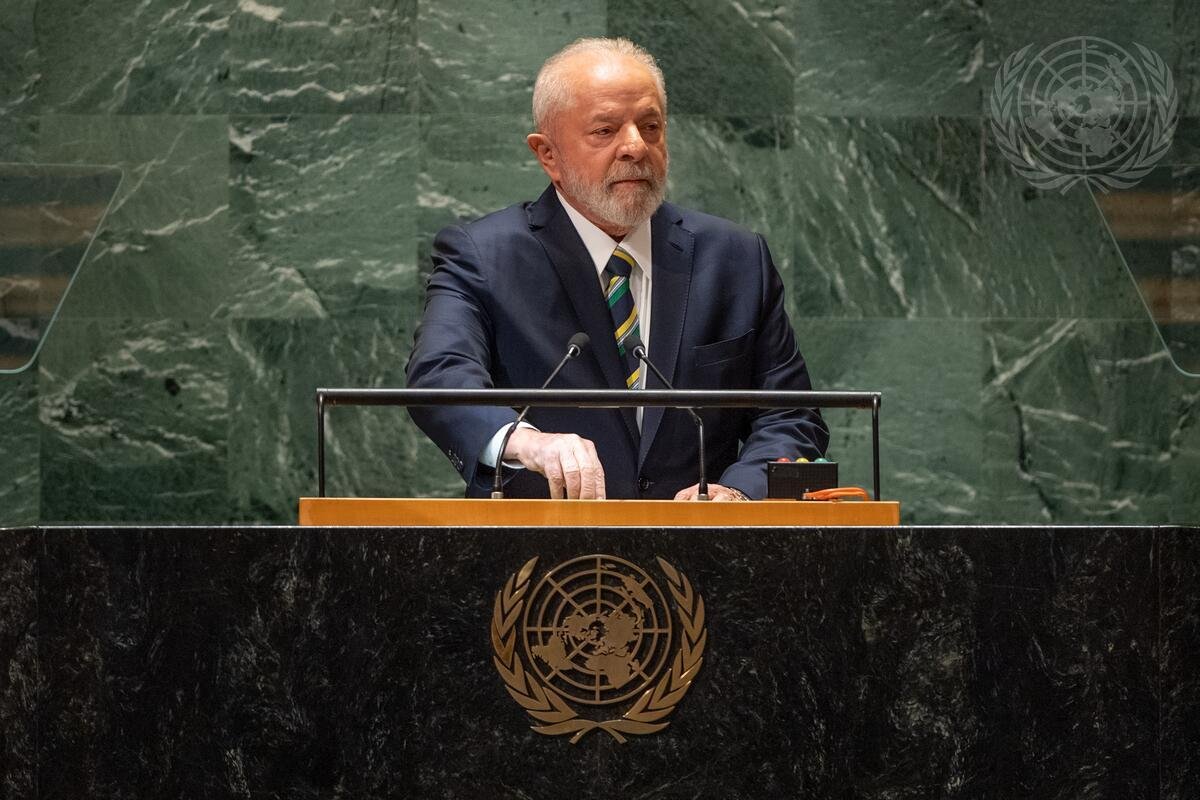Lula at the UN. Brazil is back
Rafael R. Ioris is Professor of Latin American History and Politics at the University of Denver and a WBO Research Fellow.
After four years of shame on the international scene under Bolsonaro's (mis)government, in the last eight months Brazil, led by Lula, has returned to interacting assertively and purposefully with the global community. Already in the first weeks of government, Lula returned to engagement with his neighbors, traditional partners, such as the USA, as well as more recent strategic partners, such as China, whether within a bilateral format or collectively, as with the recent meeting history of the BRICS in South Africa.
At the United Nations General Assembly this morning, Lula reaffirmed Brazil's commitment to multilateralism, while at the same time not failing to point out criticisms of the current limits of the global governance format. Lula anticipated themes that he should continue to keep on the agenda of Brazilian diplomacy throughout the next year, when Brazil will be in concomitant command of Mercosur, the G20, the expanded BRICS, and now the UN Security Council, thus having a huge platform which you can use to deepen the thesis of reforming the institutions that coordinate geopolitical and economic dimensions of today's world.
Lula began his speech on the topic of the climate crisis, which, in turn, has further deepened the already serious global socioeconomic inequality. He also stated that his own return to the UNGA is a demonstration that democracy in Brazil has overcome the authoritarian threat and that he sees this opportunity as a key to resuming the cause of combating inequality which, as it continues to be so high, threatens the achievement of development objectives. sustainable development proposed by the UN itself to be achieved by 2030. Although he recognized that inequality manifests itself in various dimensions of life, without surprises, he focused much of his criticism of the status quo on the continued existence of hunger that still afflicts millions around the world. With such a rhetorical structure, Lula, therefore, associated the fight against hunger and inequalities with the fight against deforestation, the defense of biodiversity, and the promotion of new, more sustainable forms of energy.
After reaffirming the central credentials for which Brazil is recognized on the global stage, Lula entered harshly, as expected, in criticizing the current logic of established multilateralism, which is inherently unfair. He defended the end of protectionism in rich countries and the unequal weight that industrialized countries still hold in decisions taken by international organizations. He pointed out the risk that such a governance model, by not offering real means of inclusion to those historically excluded, serves as additional fuel for the emergence of demagogic leaders, whether in the domestic environment or in the international context.
“Brazil will be in concomitant command of Mercosur, the G20, the expanded BRICS, and now the UN Security Council, thus having a huge platform which you can use to deepen the thesis of reforming the institutions that coordinate geopolitical and economic dimensions of today’s world”
Regarding the complex issue of the war in Ukraine, he reiterated the need for dialogue between the parties, which should also serve as a means to revive the role of the international community in promoting peace. He reaffirmed that such actions would be useful, in the same way, to prevent the world from being divided again between blocks of antagonistic countries under a new Cold War.
Finally, Lula stated that Brazil is willing to work with the international community in order to achieve all the objectives outlined in his speech. Likewise, he touched on several wounds of global governance such as the Palestine issue, the persecution of LGBT minorities and women, the anachronistic embargo on Cuba, and several current humanitarian and political crises on the African continent. In this sense, he presented himself as a spokesperson for key causes of the Global South, or as it has now become more common to say, the Global Majority.
In the same sense, with this speech, Lula consecrates Brazil's return to the world, as a democratic nation that has a central role in promoting progressive causes, both domestically and internationally. He defends dialogue as a way of promoting necessary changes in several dimensions, not the least of which is the environmental one. He also assumes the urgency of the issue of inequality, which can only be better resolved if new arrangements for deliberation in global governance are created.
Will Lula be heard beyond the walls of the UN headquarters, and more importantly, will there be any effective impact from such a speech? These are all important questions, but there is no way to answer them now. What is worth highlighting, however, is that with such a statement, Lula manages to reposition Brazil in its historical role and presence within the global community. And even if he were to stop with that (although I understand that such themes will continue to be advanced by Brazilian diplomacy in the coming years with increasing protagonism in the world) it would already be a fundamental advance.

